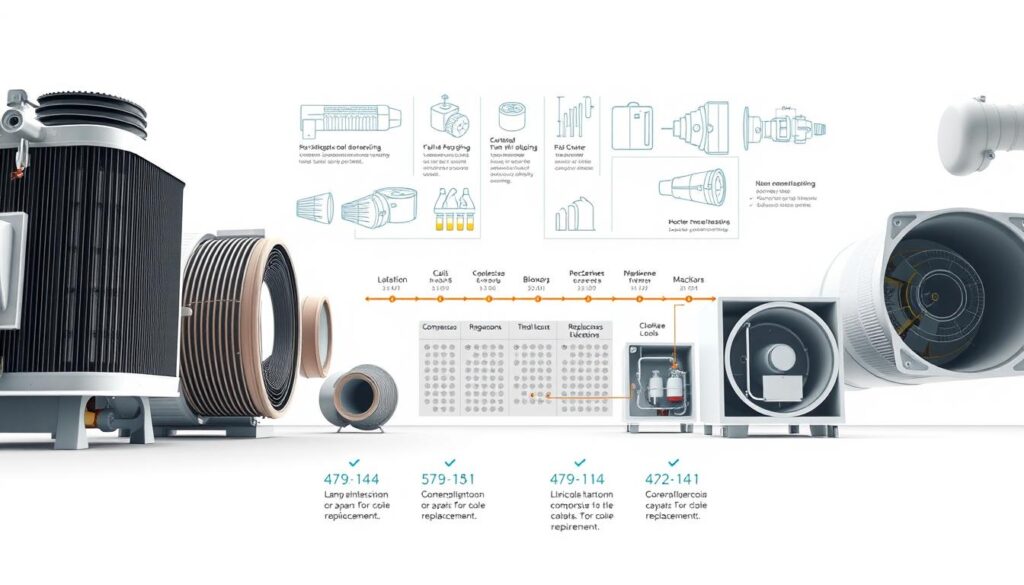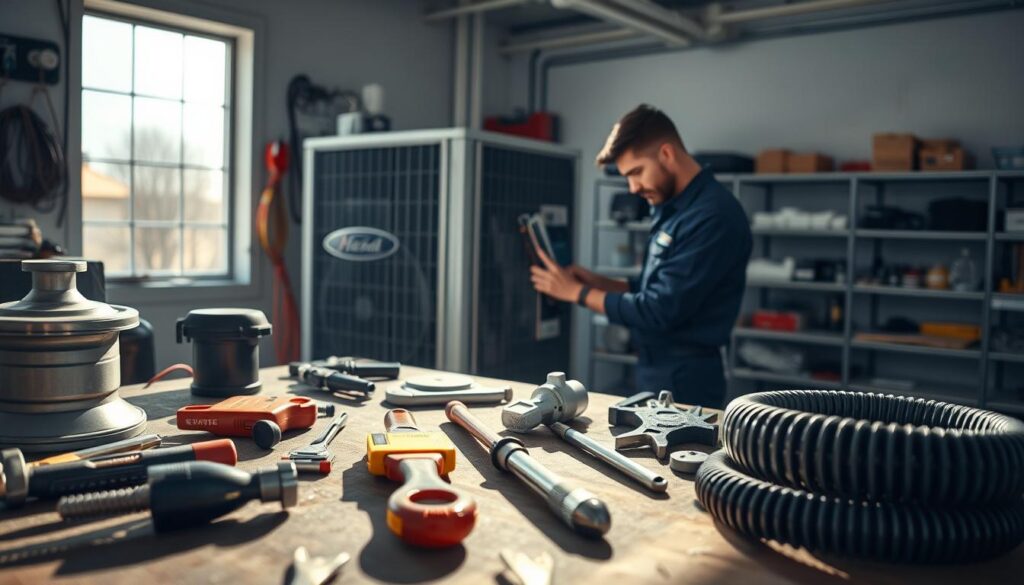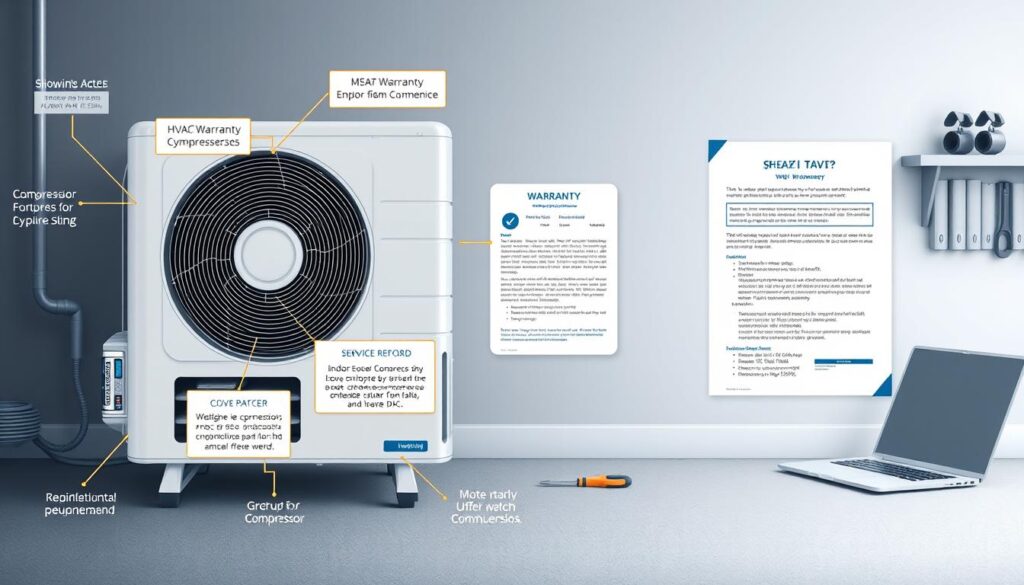Affiliate Disclosure
HVAC Guide Guys is a participant in the Amazon Services LLC Associates Program, an affiliate advertising program designed to provide a means for sites to earn advertising fees by advertising and linking to Amazon.
How Long Do HVAC Units Usually Last? Ever thought about how long your HVAC system will keep your home comfy? Knowing how long HVAC units last can save you a lot of money. It also helps you plan for future expenses.

Most HVAC systems last between 15 to 25 years. But, this time frame isn’t set in stone. How long your system lasts depends on many things like upkeep, how well it was installed, and the environment around it. Knowing this can help you decide when to fix or replace your system.
Different parts of your HVAC system wear out at different rates. Some might need to be replaced sooner than others. This means keeping up with maintenance can really help your system last longer and work better.
Key Takeaways
- Average HVAC system lifespan ranges from 15 to 25 years
- Regular maintenance can extend system performance
- Different HVAC components have varying lifespans
- Environmental factors impact system durability
- Professional installation plays a critical role in longevity
Table of Contents
Understanding HVAC System Lifespans
Your HVAC system is key to your home’s comfort. Knowing how long it lasts helps you plan for upkeep and future replacements. The lifespan of HVAC units varies due to several factors.
Most HVAC systems last between 10 to 30 years. This depends on the type and how well it’s cared for. Here’s a look at the average lifespans of different HVAC units:
- Central Air Conditioning Units: 12-17 years
- Heat Pumps: 10-16 years
- Furnaces: 15-20 years
- Geothermal Heat Pumps: 25-30 years
- Solar HVAC Systems: 25-30 years
Key Factors Influencing System Longevity
Several important factors affect your HVAC system’s lifespan:
- Maintenance Frequency: Regular checks by pros can make it last longer
- Usage Patterns: How often you use it impacts wear and tear
- Installation Quality: A pro job means better performance
- Environmental Conditions: Harsh weather can make it age faster
Geographic Location’s Impact
Your home’s location greatly affects your HVAC system’s life. Places with salty air, extreme temperatures, or high humidity can wear it down faster. Keeping your HVAC safe from harsh weather can make it last longer.
Common HVAC Types and Their Expected Service Life
Knowing how long different HVAC systems last can help you plan for replacements. Each system has its own features that affect how long it lasts.
Residential HVAC systems usually last between 10 to 25 years. This depends on the type and how well it’s maintained. Let’s look at the most common ones:
- Gas Furnaces: 20-30 years lifespan
- Air Conditioners: 15-20 years average service life
- Heat Pumps: 10-20 years, with proper maintenance
- Ductless Mini-Splits: 10-30 years of possible longevity
- Boilers: 20-35 years operational period
The actual lifespan of your system depends on many factors. Regular upkeep, local weather, how well it was installed, and how you use it all matter. These factors help determine how long your HVAC unit will work well.
Homeowners should watch for signs like higher energy bills, frequent repairs, and uneven temperatures. These could mean your system is nearing the end of its life. It might be time for a new one.
Investing in routine maintenance can significantly extend your HVAC system’s lifespan and optimize its performance.
Explore Our HVAC Shop
Looking for top-rated HVAC tools, parts, and accessories? Visit our shop and find the perfect solution for your needs.
Visit the ShopHow Long Do HVAC Units Usually Last?
Knowing how long HVAC units last is key for homeowners. It helps keep heating and cooling systems running well. The lifespan varies based on maintenance, use, and the environment.
Looking at HVAC unit lifespans, we see big differences. Let’s explore the expected lifespans for main HVAC parts:
Furnace Longevity
Furnaces are very durable, lasting 15 to 25 years on average. Electric furnaces can go up to 30 years with good care. Gas furnaces, though, last a bit less.
Air Conditioning Systems
Central air conditioning units cool well for about 15 years. But, in coastal areas, they can last much less due to salt and harsh weather.
Heat Pump Performance
Heat pumps have a unique lifespan. They usually last about 16 years. But, in tough coastal spots, they might only last 7 years.
| HVAC System Type | Average Lifespan | Coastal Area Considerations |
|---|---|---|
| Furnaces | 15-25 years | Minimal impact |
| Air Conditioners | 15 years | 7-10 years |
| Heat Pumps | 16 years | 7 years |
“Proper maintenance can significantly extend the life of your HVAC system beyond its expected lifespan.” – HVAC Maintenance Experts
- Annual maintenance is critical for maximizing system longevity
- Filter replacements should occur at least four times per year
- Professional tune-ups can help identify and fix issues early
Keep in mind, these lifespans are just averages. Your system’s real lifespan depends on the installation, how often you maintain it, and the environment it’s in.
Signs Your HVAC System Needs Replacement
Knowing when your HVAC unit needs to be replaced can prevent sudden breakdowns and expensive fixes. Most HVAC systems last 10-20 years. But, there are warning signs that show it’s time for a new one.
Look out for these key signs that your HVAC system might need to be replaced:
- Frequent and expensive repairs
- Rising energy bills with decreased efficiency
- Inconsistent temperatures throughout your home
- Unusual noises or strange odors
- System age exceeding 15 years
Knowing when to replace your HVAC is important when repair costs go up. The $5,000 rule says if your system’s age times repair costs is over $5,000, it’s cheaper to replace it.
“Proactive replacement can save you money and prevent unexpected system failures.” – HVAC Industry Expert
More signs to watch for include:
- Refrigerant leaks affecting system performance
- Excessive humidity inside your home
- Visible rust or corrosion on the unit
- Expired manufacturer warranty
Regular maintenance can help your HVAC last longer. But, sometimes, it’s cheaper to replace it. Keep an eye out for these signs to keep your home comfortable and energy-efficient.
Explore Our HVAC Shop
Looking for top-rated HVAC tools, parts, and accessories? Visit our shop and find the perfect solution for your needs.
Visit the ShopEnvironmental Factors Affecting HVAC Durability
Your HVAC system’s lifespan depends on its environment. Environmental challenges can greatly affect how long your unit lasts. Knowing these challenges helps extend your HVAC’s life.
Coastal Area Challenges
Homes near the coast face special challenges. Salt in the air can quickly damage HVAC equipment. In coastal Florida, HVAC systems usually last 10 to 15 years. Units near the beach might only last 7 years.
- Salt exposure increases metal degradation
- Coastal humidity can cause rapid component breakdown
- Frequent maintenance becomes critical in marine environments
Climate Impact on System Performance
Different climates affect HVAC systems differently. Extreme temperatures can stress and shorten their lifespan.
“In California, well-maintained HVAC systems can last between 12 to 25 years, showing the need for environmental adaptation.”
Indoor Air Quality Effects
Your home’s air quality is key to your HVAC’s life. Poor air quality can harm system parts, leading to early wear.
- Replace air filters every 60-90 days
- Control indoor humidity levels
- Reduce chemical pollutant exposure
Understanding these environmental factors helps protect and extend your HVAC’s life.
Maintenance Tips to Extend HVAC Lifespan

Keeping your HVAC system in top shape is key to making it last longer. It’s a big investment in your home. Taking good care of it can make it work better and last longer.
Regular maintenance is important for your HVAC system’s health:
- Change air filters every 1-3 months to reduce energy consumption
- Schedule professional tune-ups twice annually
- Clean condensate drain lines to prevent water damage
- Inspect and seal ductwork for optimal airflow
Doing these maintenance tasks can help your system run at its best. Proactive care reduces the risk of costly repairs by up to 30%. Regular checks can make your HVAC last longer.
| Maintenance Task | Frequency | Potential Benefits |
|---|---|---|
| Air Filter Replacement | Every 1-3 months | 15% energy reduction |
| Professional Tune-up | Twice per year | 30% repair risk reduction |
| Duct Cleaning | Every 3-5 years | Improved system efficiency |
By following these maintenance tips, you can make your HVAC last up to 25 years. Remember, regular care is the secret to a reliable and efficient HVAC system.
Cost Considerations: Repair vs. Replace
Choosing between repairing or replacing your HVAC system is tough. Your decision depends on financial and performance factors. These factors affect your home’s comfort and future costs.
- Age of the current system
- How often repairs are needed
- Energy efficiency
- Total repair costs
The $5,000 Rule Explained
The $5,000 rule helps decide when to replace your HVAC. Multiply the unit’s age by the repair cost. If it’s over $5,000, it’s cheaper to replace than keep fixing it.
Energy Efficiency Benefits
New HVAC systems save a lot of energy. Switching from an old SEER 9 to a SEER 14 can cut energy use by over 35%. New air conditioners with SEER ratings up to 26 save even more money in the long run.
Return on Investment Analysis
Investing in a new HVAC system can pay off big time. You might get tax credits up to 30% and utility rebates. The cost to install is between $5,000 and $12,500. But, savings and incentives can help cover these costs.
Strategic HVAC replacement can make your home more energy-efficient and comfortable. It also offers big financial benefits.
Understanding HVAC Warranty Coverage
Understanding HVAC warranty coverage can seem like solving a puzzle. Knowing how long your HVAC unit will last depends on these warranty details. Most modern HVAC systems come with warranties from 5 to 10 years. These warranties protect you from sudden part failures.

- Parts coverage typically lasts 5-10 years
- Labor warranties are often more limited
- Compressor warranties may extend up to 10 years
- Heat exchangers can have lifetime limited warranties
To get the most out of your HVAC, it’s key to know about warranty details. Registering your equipment within 60-90 days after installation is usually required for full coverage. Also, manufacturers often need you to have annual professional maintenance to keep warranties active.
| Warranty Type | Typical Coverage Duration | Key Considerations |
|---|---|---|
| Standard Parts Warranty | 5-10 years | Covers manufacturing defects |
| Labor Warranty | 1-5 years | Provided by installer |
| Extended Warranty | Up to 10 years | Additional purchased coverage |
“A well-maintained HVAC system with proper warranty coverage can save you thousands in possible repair costs.”
It’s important to know what’s not covered by warranties. Damage from storms, electrical surges, or wrong installation can cancel your warranty. Keep good maintenance records and understand your warranty terms to safeguard your investment.
Explore Our HVAC Shop
Looking for top-rated HVAC tools, parts, and accessories? Visit our shop and find the perfect solution for your needs.
Visit the ShopModern HVAC Technology and Longevity Improvements
Modern HVAC technology has changed the game for homeowners. It offers new ways to make HVAC systems last longer. New innovations are making heating and cooling systems better in every way.
These advancements bring big changes to HVAC durability:
- Variable-speed motors reduce mechanical stress
- Smart thermostats optimize system performance
- Advanced materials make components more resilient
- Improved refrigerant technologies
New HVAC systems have smart design features that cut down on wear and tear. Precision engineering makes components work better, which means they last longer.
| Technology | Longevity Impact | Energy Efficiency |
|---|---|---|
| Smart Thermostats | Up to 25% reduced system strain | 15-20% energy savings |
| Variable-Speed Motors | Extended component life | Lower energy consumption |
| Advanced Refrigerants | Improved system performance | Reduced environmental impact |
By choosing modern HVAC technology, you’re getting more than just a system. You’re investing in a long-lasting, energy-saving solution for your home’s comfort.
Conclusion
Knowing how long HVAC units last is key for homeowners. Most systems last 15 to 20 years. But, this can change based on how well you maintain it, how often you use it, and your environment.
Keeping your HVAC in good shape can really help. Regular checks and quick fixes are important. They help your system work better and last longer.
Simple steps like changing filters and getting yearly checks can help a lot. These actions can make your system last longer.
How well you take care of your HVAC unit affects its lifespan. Watch for signs like high energy bills or uneven temperatures. If you see these, it might be time for a new one.
Getting a new, efficient HVAC system can save you money and keep you comfortable. It’s a smart investment for the long run.
Every HVAC system is different. Its lifespan depends on many things. Stay informed, take care of it, and work with experts to keep it running well for years.

